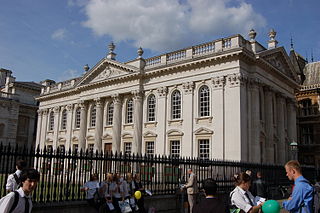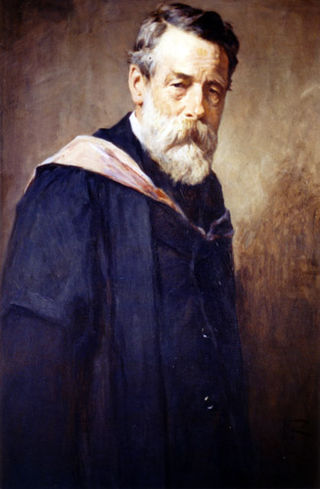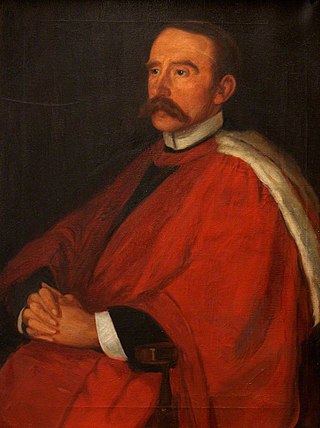
At the University of Cambridge, a Tripos is any of the examinations that qualify an undergraduate for a bachelor's degree or the courses taken by a student to prepare for these. For example, an undergraduate studying mathematics is said to be reading for the Mathematical Tripos, whilst a student of English literature is reading for the English Tripos.

The British undergraduate degree classification system is a grading structure for undergraduate degrees or bachelor's degrees and integrated master's degrees in the United Kingdom. The system has been applied in other countries and regions.
Literae humaniores, nicknamed classics, is an undergraduate course focused on classics at the University of Oxford and some other universities. The Latin name means literally "more human literature" and was in contrast to the other main field of study when the university began, i.e. res divinae, also known as theology. Lit. hum. is concerned with human learning, and lit. div. with learning treating of God. In its early days, it encompassed mathematics and natural sciences as well. It is an archetypal humanities course.
Gilbert Arthur Highet was a Scottish American classicist, academic writer, intellectual critic, and literary historian.

Alan Douglas Edward Cameron, was a British classicist and academic. He was Charles Anthon Professor Emeritus of the Latin Language and Literature at Columbia University, New York. He was one of the leading scholars of the literature and history of the later Roman world and at the same time a wide-ranging classical philologist whose work encompassed above all the Greek and Latin poetic tradition from Hellenistic to Byzantine times but also aspects of late antique art.
The use of the term Prelim generally refers to an examination that qualifies a student to continue studies at a higher level, and/or allow the student to comprehend their studies and see how prepared they are for an upcoming examination. It can also act as a gauge on how knowledgeable one is within the chosen subject.

Eric Robertson Dodds was an Irish classical scholar. He was Regius Professor of Greek at the University of Oxford from 1936 to 1960.
John Dewar Denniston was a British classical scholar.
Robert Ranulph Marett was a British ethnologist and a proponent of the British Evolutionary School of cultural anthropology. Founded by Marett's older colleague, Edward Burnett Tylor, it asserted that modern primitive societies provide evidence for phases in the evolution of culture, which it attempted to recapture via comparative and historical methods. Marett focused primarily on the anthropology of religion. Studying the evolutionary origin of religions, he modified Tylor's animistic theory to include the concept of mana. Marett's anthropological teaching and writing career at Oxford University spanned the early 20th century before World War Two. He trained many notable anthropologists. He was a colleague of John Myres, and through him, studied Aegean archaeology.
The Classical Tripos is the taught course in classics at the Faculty of Classics, University of Cambridge. It is equivalent to Literae Humaniores at Oxford. It is traditionally a three-year degree, but for those who have not previously studied Latin and Greek, a four-year course has been introduced. It is not essential to have a Greek A-Level to study for the three-year degree as intensive Greek teaching is available, but most students will have a Latin A-Level.

James Leigh Strachan-Davidson was an English classical scholar, academic administrator, translator, and author of books on Roman history. He was Master of Balliol College, Oxford from 1907 until his death in 1916.
Lawrence Henry Yaw Ofosu-Appiah was a Ghanaian academic who taught classics at the University of Ghana and was subsequently Director of the Encyclopedia Africana.

Dame Emily Penrose, was an ancient historian and principal of three early women's university colleges in the United Kingdom: Bedford College from 1893 until 1898, Royal Holloway College from 1898 until 1907, and Somerville College, Oxford University from 1907 until 1926. She was the first woman to achieve First Class honours in Classics at Oxford University, and was instrumental in securing the admission of women as full members of the university in 1920. She became Oxford's first Dame in 1927.
Nicholas James Richardson is a British Classical scholar and formerly Warden of Greyfriars, Oxford, from 2004 until 2007.
Martin Hammond is an English classical scholar and former public school headmaster.

Thomas Francis Roberts (1860–1919) was a Welsh academic and second Principal of the University College of Wales, Aberystwyth.

The Faculty of Classics, previously the Faculty of Literae Humaniores, is a subdivision of the University of Oxford concerned with the teaching and research of classics. The teaching of classics at Oxford has been going on for 900 years, and was at the centre of nearly all its undergraduates' education well into the twentieth century.
Courtenay Edward Stevens was a British classicist. He was educated at Winchester College and received a first class degree in literae humaniores from New College, Oxford. Stevens remained at Oxford after graduation, receiving scholarships and, in 1933, a research fellowship at Magdalen College. During the Second World War he worked for British military intelligence, specialising in propaganda. Stevens produced German-language newspapers and broadcasts and suggested the use of the first notes of Beethoven's Fifth Symphony for Allied broadcasts. After the war he returned to Magdalen, taking on a huge teaching workload of up to 72 hours per week. Stevens enjoyed success, in partnership with the philosopher J. L. Austin, in preparing students for examination in the Greats. He served as vice-president of the college from 1950–51.
The undergraduate education at the University of Oxford in England involves weekly tutorials at the colleges and halls, supported by classes, lectures and laboratory work provided by university faculties and departments.
John Wintour Baldwin Barns was a British Egyptologist, papyrologist, Anglican priest, and academic. From 1965 to 1974, he was Professor of Egyptology at the University of Oxford.








